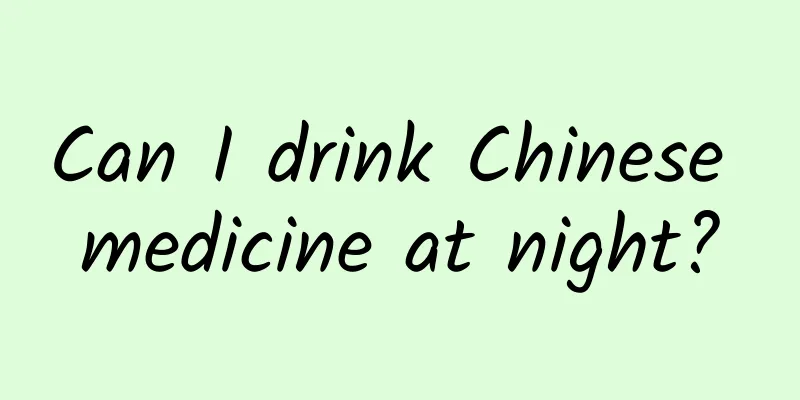Can I drink Chinese medicine at night?

|
As people learn more and more about medical knowledge, they are more inclined to use Chinese medicinal materials to regulate their bodies in daily life. This is because Western medicines are developed through chemical reactions, which will more or less cause some harm to the body, while many Chinese medicines are some of the foods people eat on a daily basis, and the harm to the body is very small. If I take Chinese medicine, can I take it at night? 1. Can I drink Chinese medicine at night? You can also take Chinese medicine at night without affecting its effects. 2. Time to take Chinese medicine 1. Take on an empty stomach. Also known as taking medicine at dawn, it means taking the medicine in the morning before eating. Decoctions with tonic effects should be taken on an empty stomach in the morning to facilitate full absorption. Drugs used to deworm or treat limb blood vessel diseases should also be taken on an empty stomach, so that the drugs can enter the intestines quickly and maintain a high concentration to quickly exert their effects. The same is true for decoctions with laxative effects to enhance the efficacy. 2. Take before meals. Generally, take the medicine 30 to 60 minutes before meals. If the disease is located in the lower part of the body, the medicine should be taken before meals so that the medicinal properties can be easily delivered to the lower part of the body, such as liver and kidney deficiency or diseases below the waist. For the treatment of intestinal diseases, it is also advisable to take medicine before meals. Because, when the stomach is empty, the drug solution can directly contact the gastrointestinal mucosa and pass through the stomach into the intestine more quickly, so that more of it can be absorbed and take effect, without being diluted by food in the stomach and affecting its efficacy. 3. Take after meals. Generally, take the medicine 15 to 30 minutes after a meal. If the disease is located in the upper part of the body, the medicine should be taken after meals. If you are treating diseases related to the heart, lungs, chest, diaphragm, or stomach, you should take the medicine after meals to allow the medicinal properties to move upward. Taking drugs that are irritating to the gastrointestinal tract after meals can reduce damage to the gastrointestinal mucosa. 4. Take before bedtime. It is usually taken 15 to 30 minutes before bedtime. Drugs that nourish the heart and spleen, calm the mind, and induce sleep can be taken at this time. In addition, some western medicines such as hypnotics, anthelmintics and anti-allergic drugs should generally be taken half an hour before going to bed at night. 3. Daily tips on the taboos of taking Chinese medicine When taking Chinese medicine, there are some dietary taboos that you need to know in order not to affect the effectiveness of the medicine. It is not advisable to eat raw radish when taking Chinese medicine (except for taking qi-regulating and phlegm-resolving medicines), because radish has the effects of helping food and breaking up qi. Especially when taking tonic Chinese medicines such as ginseng and astragalus, eating radish will weaken the tonic effects of ginseng, reduce the efficacy of the medicine and fail to achieve the therapeutic purpose. Raw and cold foods are mostly cold in nature and difficult to digest. Raw and cold foods can also easily irritate the gastrointestinal tract and affect the gastrointestinal absorption of drugs. Therefore, when taking Chinese medicine to treat "cold symptoms", such as medicines for warming the meridians and unblocking the collaterals, dispelling cold and dampness, or medicines for strengthening the spleen and warming the stomach, you must not avoid raw and cold foods. Generally, do not drink strong tea when taking Chinese medicine, because tea contains tannic acid. Strong tea contains more tannic acid. When taken with Chinese medicine, it will affect the body's absorption of the active ingredients in the medicine and reduce its efficacy. Especially when taking "ejiao" and "tremella", avoid taking them with tea. Taking them at the same time will cause the tannic acid, bioalkali, etc. in the tea to precipitate, affecting the body's absorption. If you have the habit of drinking tea, you can drink a little green tea, and it is best to drink it 2 to 3 hours after taking the medicine. Hot and spicy foods are mostly warm in nature, and they consume qi and stimulate fire. If you are taking Chinese medicine for clearing away heat and eliminating toxins, nourishing yin and increasing fluid, cooling blood and nourishing yin, or during the treatment of febrile diseases such as carbuncles, ulcers and toxins, you should avoid spicy food. Spicy and hot foods such as onions, garlic, pepper, mutton, and dog meat, if consumed, will offset the effects of traditional Chinese medicine. Some may even induce inflammation, damage the yin and cause bleeding. Greasy foods are sticky, promote dampness and phlegm, cause loose bowels and stagnant gas, and are difficult to digest and absorb. Moreover, mixing greasy foods with medicines can hinder the gastrointestinal absorption of the active ingredients of the medicines, thereby reducing the efficacy. While taking Chinese medicine, Eating greasy food will inevitably affect the absorption of Chinese medicine. Therefore, patients with heavy phlegm and dampness, weak spleen and stomach, indigestion, hypertension, coronary heart disease, hyperlipidemia, high blood viscosity and obesity must avoid eating greasy foods such as animal fats. Generally, Chinese medicines have aromatic smells, especially aromatic dehumidifying and aromatic qi-regulating medicines, which contain a large amount of volatile oils to exert their therapeutic effects. These aromatic substances are most incompatible with fishy smells. If you do not avoid fishy smell when taking Chinese medicine, it will often affect the efficacy of the medicine. Such as the fishy smell of fish, shrimp, and seafood, and the mutton smell of cattle and mutton. Patients with allergic dermatitis such as allergic asthma, allergic rhinitis, boils, eczema, urticaria, etc. must avoid eating fishy foods while taking Chinese medicine. They should also eat less fishy, spicy and irritating foods such as chicken, lamb, pork head, crab, and goose meat. Because these foods contain foreign proteins, some patients are particularly sensitive and prone to allergies, which aggravates their condition. |
<<: What are the effects of Chinese medicinal material mulberry branch
>>: Can osmanthus be soaked in water?
Recommend
What are some Chinese medicines that can improve immunity?
Different people have different physiques and dif...
How well can materials perform when they are “freed” from gravity and are evenly heated and solidified?
Produced by: Science Popularization China Author:...
Does your toilet smell like rotten eggs? Be careful!
If you smell a pungent smell of rotten eggs in th...
Do you know the story behind Beidou satellite?
From the successful launch of the first BeiDou-1 ...
Five days of deprivation of rationality: What exactly do people who fall into pyramid schemes experience?
If you make a promise in front of others, you wil...
The efficacy and function of Guangzhou Mandarin
The environment is now seriously deteriorating an...
The efficacy and function of Artemisia annua
As people's research on traditional Chinese m...
Who says wild boars can’t eat fine bran? They don’t really want it!
If ordinary people are told that "wild boars...
The efficacy and function of bear brain
I wonder if you have ever heard of bear brain. Be...
The efficacy and function of the saber
Ma Dao is a kind of traditional Chinese medicine....
The efficacy and function of ground peanuts
Traditional Chinese medicine is very helpful in t...
What are the effects and functions of Astragalus membranaceus
Astragalus melongena is a kind of fungus food. It...
About to be "launched", what happened to the United Launch Alliance?
Recently, according to foreign media reports, the...
What is the best deer antler stew?
Many friends know that deer antler is a relativel...









